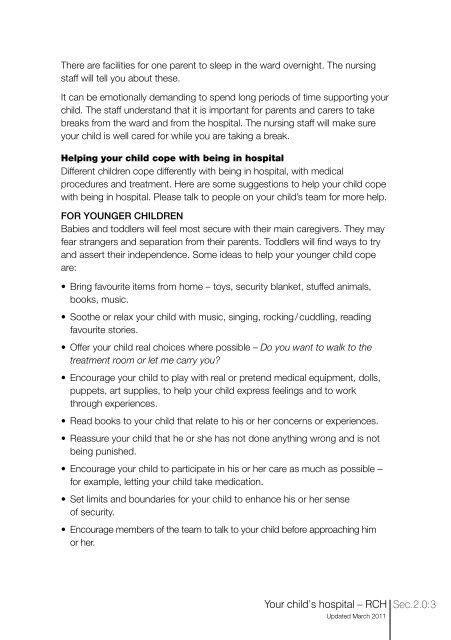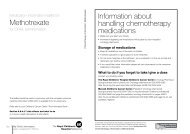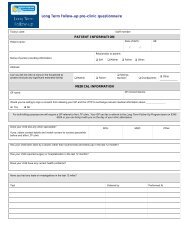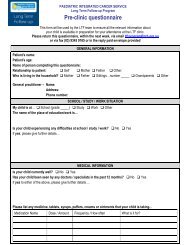The information book - Paediatric Integrated Cancer Service
The information book - Paediatric Integrated Cancer Service
The information book - Paediatric Integrated Cancer Service
You also want an ePaper? Increase the reach of your titles
YUMPU automatically turns print PDFs into web optimized ePapers that Google loves.
<strong>The</strong>re are facilities for one parent to sleep in the ward overnight. <strong>The</strong> nursing<br />
staff will tell you about these.<br />
It can be emotionally demanding to spend long periods of time supporting your<br />
child. <strong>The</strong> staff understand that it is important for parents and carers to take<br />
breaks from the ward and from the hospital. <strong>The</strong> nursing staff will make sure<br />
your child is well cared for while you are taking a break.<br />
Helping your child cope with being in hospital<br />
Different children cope differently with being in hospital, with medical<br />
procedures and treatment. Here are some suggestions to help your child cope<br />
with being in hospital. Please talk to people on your child’s team for more help.<br />
FOR YOUNGER CHILDREN<br />
Babies and toddlers will feel most secure with their main caregivers. <strong>The</strong>y may<br />
fear strangers and separation from their parents. Toddlers will find ways to try<br />
and assert their independence. Some ideas to help your younger child cope<br />
are:<br />
• Bring favourite items from home – toys, security blanket, stuffed animals,<br />
<strong>book</strong>s, music.<br />
• Soothe or relax your child with music, singing, rocking / cuddling, reading<br />
favourite stories.<br />
• Offer your child real choices where possible – Do you want to walk to the<br />
treatment room or let me carry you?<br />
• Encourage your child to play with real or pretend medical equipment, dolls,<br />
puppets, art supplies, to help your child express feelings and to work<br />
through experiences.<br />
• Read <strong>book</strong>s to your child that relate to his or her concerns or experiences.<br />
• Reassure your child that he or she has not done anything wrong and is not<br />
being punished.<br />
• Encourage your child to participate in his or her care as much as possible –<br />
for example, letting your child take medication.<br />
• Set limits and boundaries for your child to enhance his or her sense<br />
of security.<br />
• Encourage members of the team to talk to your child before approaching him<br />
or her.<br />
Your child’s hospital – RCH Sec.2.0:3<br />
Updated March 2011















